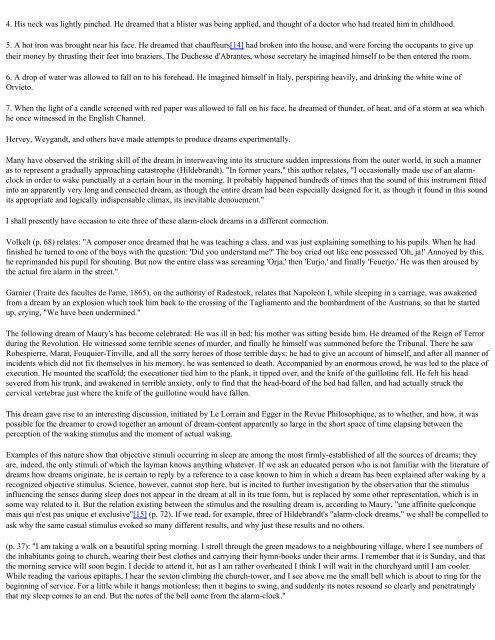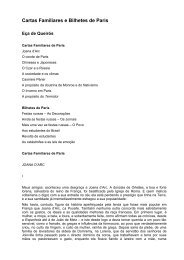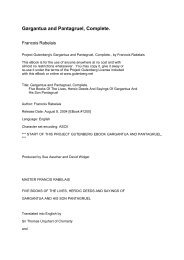The Interpretation of Dreams Sigmund Freud (1900)
The Interpretation of Dreams Sigmund Freud (1900)
The Interpretation of Dreams Sigmund Freud (1900)
Create successful ePaper yourself
Turn your PDF publications into a flip-book with our unique Google optimized e-Paper software.
4. His neck was lightly pinched. He dreamed that a blister was being applied, and thought <strong>of</strong> a doctor who had treated him in childhood.<br />
5. A hot iron was brought near his face. He dreamed that chauffeurs[14] had broken into the house, and were forcing the occupants to give up<br />
their money by thrusting their feet into braziers. <strong>The</strong> Duchesse d'Abrantes, whose secretary he imagined himself to be then entered the room.<br />
6. A drop <strong>of</strong> water was allowed to fall on to his forehead. He imagined himself in Italy, perspiring heavily, and drinking the white wine <strong>of</strong><br />
Orvieto.<br />
7. When the light <strong>of</strong> a candle screened with red paper was allowed to fall on his face, he dreamed <strong>of</strong> thunder, <strong>of</strong> heat, and <strong>of</strong> a storm at sea which<br />
he once witnessed in the English Channel.<br />
Hervey, Weygandt, and others have made attempts to produce dreams experimentally.<br />
Many have observed the striking skill <strong>of</strong> the dream in interweaving into its structure sudden impressions from the outer world, in such a manner<br />
as to represent a gradually approaching catastrophe (Hildebrandt). "In former years," this author relates, "I occasionally made use <strong>of</strong> an alarmclock<br />
in order to wake punctually at a certain hour in the morning. It probably happened hundreds <strong>of</strong> times that the sound <strong>of</strong> this instrument fitted<br />
into an apparently very long and connected dream, as though the entire dream had been especially designed for it, as though it found in this sound<br />
its appropriate and logically indispensable climax, its inevitable denouement."<br />
I shall presently have occasion to cite three <strong>of</strong> these alarm-clock dreams in a different connection.<br />
Volkelt (p. 68) relates: "A composer once dreamed that he was teaching a class, and was just explaining something to his pupils. When he had<br />
finished he turned to one <strong>of</strong> the boys with the question: 'Did you understand me?' <strong>The</strong> boy cried out like one possessed 'Oh, ja!' Annoyed by this,<br />
he reprimanded his pupil for shouting. But now the entire class was screaming 'Orja,' then 'Eurjo,' and finally 'Feuerjo.' He was then aroused by<br />
the actual fire alarm in the street."<br />
Garnier (Traite des facultes de l'ame, 1865), on the authority <strong>of</strong> Radestock, relates that Napoleon I, while sleeping in a carriage, was awakened<br />
from a dream by an explosion which took him back to the crossing <strong>of</strong> the Tagliamento and the bombardment <strong>of</strong> the Austrians, so that he started<br />
up, crying, "We have been undermined."<br />
<strong>The</strong> following dream <strong>of</strong> Maury's has become celebrated: He was ill in bed; his mother was sitting beside him. He dreamed <strong>of</strong> the Reign <strong>of</strong> Terror<br />
during the Revolution. He witnessed some terrible scenes <strong>of</strong> murder, and finally he himself was summoned before the Tribunal. <strong>The</strong>re he saw<br />
Robespierre, Marat, Fouquier-Tinville, and all the sorry heroes <strong>of</strong> those terrible days; he had to give an account <strong>of</strong> himself, and after all manner <strong>of</strong><br />
incidents which did not fix themselves in his memory, he was sentenced to death. Accompanied by an enormous crowd, he was led to the place <strong>of</strong><br />
execution. He mounted the scaffold; the executioner tied him to the plank, it tipped over, and the knife <strong>of</strong> the guillotine fell. He felt his head<br />
severed from his trunk, and awakened in terrible anxiety, only to find that the head-board <strong>of</strong> the bed had fallen, and had actually struck the<br />
cervical vertebrae just where the knife <strong>of</strong> the guillotine would have fallen.<br />
This dream gave rise to an interesting discussion, initiated by Le Lorrain and Egger in the Revue Philosophique, as to whether, and how, it was<br />
possible for the dreamer to crowd together an amount <strong>of</strong> dream-content apparently so large in the short space <strong>of</strong> time elapsing between the<br />
perception <strong>of</strong> the waking stimulus and the moment <strong>of</strong> actual waking.<br />
Examples <strong>of</strong> this nature show that objective stimuli occurring in sleep are among the most firmly-established <strong>of</strong> all the sources <strong>of</strong> dreams; they<br />
are, indeed, the only stimuli <strong>of</strong> which the layman knows anything whatever. If we ask an educated person who is not familiar with the literature <strong>of</strong><br />
dreams how dreams originate, he is certain to reply by a reference to a case known to him in which a dream has been explained after waking by a<br />
recognized objective stimulus. Science, however, cannot stop here, but is incited to further investigation by the observation that the stimulus<br />
influencing the senses during sleep does not appear in the dream at all in its true form, but is replaced by some other representation, which is in<br />
some way related to it. But the relation existing between the stimulus and the resulting dream is, according to Maury, "une affinite quelconque<br />
mais qui n'est pas unique et exclusive"[15] (p. 72). If we read, for example, three <strong>of</strong> Hildebrandt's "alarm-clock dreams," we shall be compelled to<br />
ask why the same casual stimulus evoked so many different results, and why just these results and no others.<br />
(p. 37): "I am taking a walk on a beautiful spring morning. I stroll through the green meadows to a neighbouring village, where I see numbers <strong>of</strong><br />
the inhabitants going to church, wearing their best clothes and carrying their hymn-books under their arms. I remember that it is Sunday, and that<br />
the morning service will soon begin. I decide to attend it, but as I am rather overheated I think I will wait in the churchyard until I am cooler.<br />
While reading the various epitaphs, I hear the sexton climbing the church-tower, and I see above me the small bell which is about to ring for the<br />
beginning <strong>of</strong> service. For a little while it hangs motionless; then it begins to swing, and suddenly its notes resound so clearly and penetratingly<br />
that my sleep comes to an end. But the notes <strong>of</strong> the bell come from the alarm-clock."









